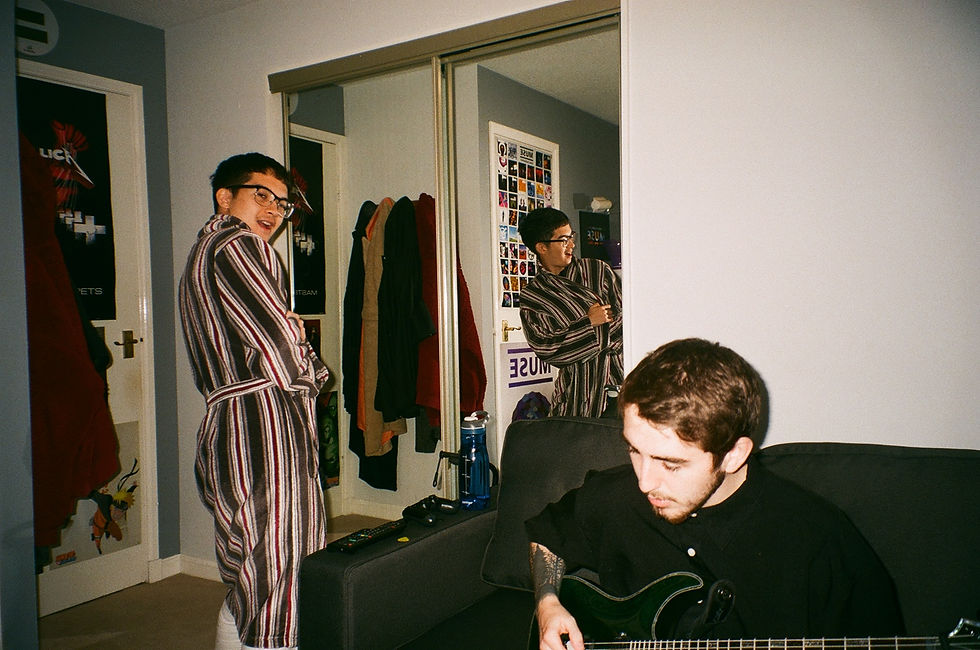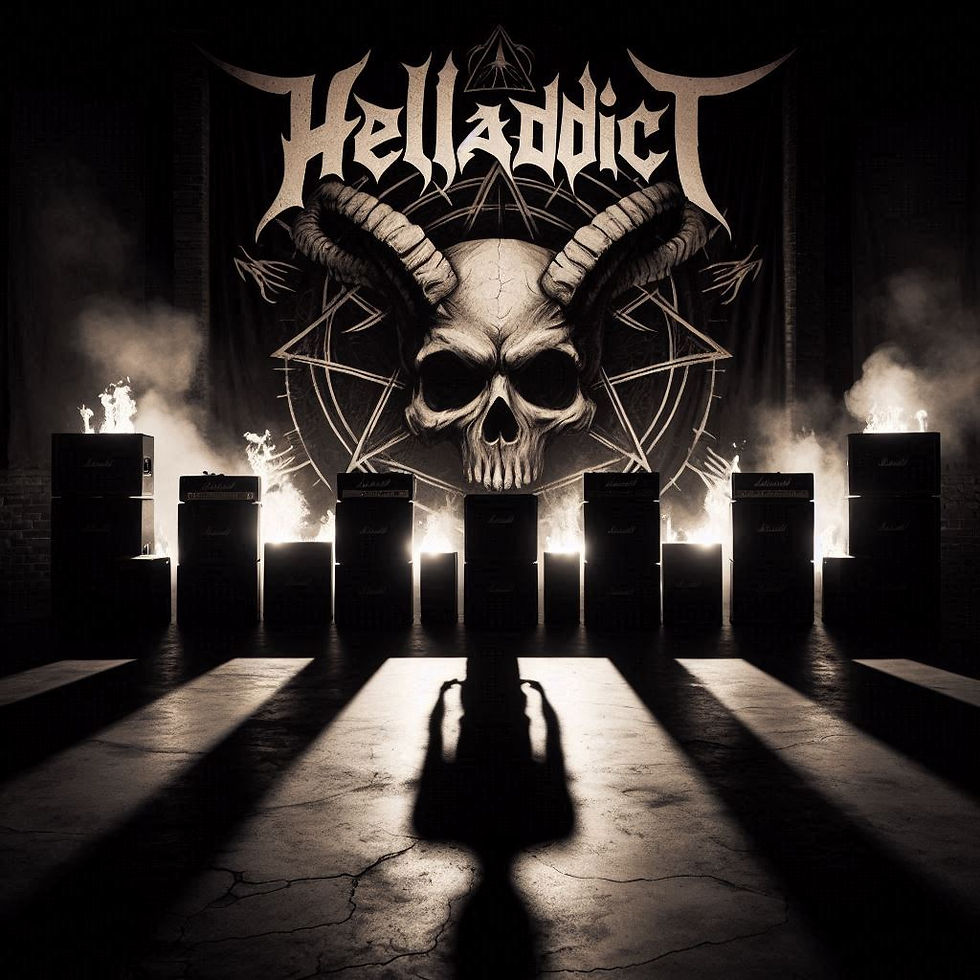Weekly Discover 59 - Unpolished & Unashamed
- Fernando Triff

- Aug 11, 2025
- 14 min read
Some music doesn’t ask permission to exist—it barges in, unapologetic and unfiltered. This week’s selection lives in those unruly spaces where melody scrapes against discomfort, and every note feels intentional yet untamed. These songs don’t fade politely into the background—they lean forward and stare you down.
Here, the rules aren’t bent; they’re discarded. Voices strain and break, not out of flaw, but because they’re holding something heavy. The percussion limps and lunges like it’s carrying its own battle scars. Even the mix wears its rough edges like a badge of honor.
This isn’t about pleasing everyone. It’s about making you feel—even if it’s uneasy, even if it’s messy. There are no neatly tied choruses, no polished symmetry—only raw textures, exposed emotions, and rhythms that refuse to stand still.
What binds these tracks is that rare spark—the moment you realize you’re hearing something too honest to be perfect, too alive to be contained.
Mary Beth Orr Makes the French Horn Speak

Mary Beth Orr doesn’t just play the French horn — she makes it speak. On her new album The Singing Horn, she leans into the instrument’s lyrical side, letting it intertwine with her own voice until you’re not sure where one ends and the other begins. I threw it on expecting something niche and academic, but instead found myself pulled into a strange, moving conversation between brass and breath. It’s not often an album feels like it’s talking to you.
The record opens with a sequence that feels almost like chapters in a novella. The first five tracks move as one thought — folk melodies and classical phrasing spilling into each other — and by the time “Oh Death” arrives, it’s less a song than a reckoning. Later, she folds in “Good and True,” a piece inspired by the birthing song of the Dagara Tribe, something you don’t usually hear in the same breath as Mahler. That’s Orr’s thing, though: she’s constantly bridging distances most people don’t think to cross.
What’s wild is how much range this project covers without ever feeling like a variety show. One minute you’re in the comfort of “I’ll Fly Away,” the next you’re inside Mahler’s Songs of the Wayfarer, and somehow they belong to the same world. She calls it “a love letter to my life, and to yours,” which sounds lofty until you actually listen — then you realize she means it in the most literal way. This isn’t a concept album. It’s a scrapbook.
Orr’s classical résumé could easily intimidate — 3rd Horn of the Grand Rapids Symphony, gigs with the Detroit and Charleston Symphonies, competition wins stacked like trophies on a shelf. But the thing is, The Singing Horn doesn’t feel like a flex. If anything, it feels like she’s letting her guard down. The polish is still there — years of orchestral discipline don’t just vanish — but there’s a looseness, an emotional risk-taking, that makes the album hit harder than a recital hall performance ever could.
Listening front to back, you can tell this project was a massive lift. Twenty-six tracks is no casual weekend session. She even writes about the process in the album notes, and reading those while the music plays is like sitting across from her at a kitchen table, coffee going cold, stories spilling out. That’s where the motherhood, the grief, the love all come through — not in some over-arranged “artistic statement,” but in the way she ties each song back to an actual lived moment.
The industry seems to be noticing, too. The Singing Horn snagged Silver Outstanding Achievement Honors at the 2025 Global Music Awards, which isn’t the kind of recognition that happens by accident. But more than accolades, I think Orr’s success here is in how she’s managed to make something so technically demanding feel this personal. You can be halfway through track 14 before it even registers how hard it is to do what she’s doing.
By the time the final notes fade, you’re not left with a moral or a message, just the sense that you’ve been trusted with something real. It makes you want to hit play again — not out of habit, but because you feel like you missed a detail, a breath, a little shift in tone that might change everything. I’ve already gone back three times, and I’m still finding new corners in it. If you’re going to dive in, do yourself a favor: headphones on, distractions off, and let her talk to you. It’s worth it.
Part of a Bigger Map: Di Stefano's "Kotokashi"

When you first hit play on Kotokashi, there’s this quiet moment where you almost wonder if you’re about to hear a centuries-old recording. The koto strings feel like they’re being plucked in some Edo-period tea house—until a modern, almost weightless electronic bed starts to swell underneath. That’s Di Stefano’s trick. He’s not out here trying to make “East meets West” wallpaper music. He’s building little time machines, one region at a time, and Kotokashi just happens to stop in Japan.
This isn’t a “collaboration-heavy” kind of record. In fact, Stefano did almost everything himself in his Miami home studio—composing, arranging, producing. The only other fingerprints belong to Elliot, his go-to engineer who seems to know exactly how to keep the air in a mix without losing punch, and a Japanese vocalist brought in to make sure every syllable in the piece felt true. The production is pristine, but not plastic. You can hear the room in it. You can hear the human hands on the strings.
The influences are right there on the surface—ancient Japanese instruments like the koto and taiko, Edo-period tonal structures—but the point isn’t mimicry. Stefano isn’t trying to cosplay as a Japanese composer; he’s filtering those textures through his own lens as a modern electronic artist. There’s a difference. You get the sense he’s studied the roots but refuses to get stuck in them. It’s reverent without being rigid.
The funny thing is, Stefano’s never even been to Japan. He recorded the whole thing in Miami, but it doesn’t feel like a “remote interpretation.” He talks about bringing the world into his DAW, almost like each track is a passport stamp. That might sound lofty, but it plays out in a surprisingly grounded way—every instrument choice, every ambient imperfection is intentional. And yet, he admits he chased perfection here and still feels it slipped away. That’s where the Wabi-Sabi comes in.
I’ve listened to a lot of “world electronica” over the years, and plenty of it feels like a travel brochure soundtrack—pleasant, forgettable. Kotokashi is different because it’s not trying to sell you the destination. It just slows you down long enough to feel like you’re there. The reverb tails are long but not lazy, the taiko hits are present but not overblown. It’s a producer who trusts that stillness can be just as gripping as a drop.
Stefano’s already got over 10,000 monthly listeners without big-budget campaigns or playlist gimmicks, and you can tell he’s playing the long game. Kotokashi isn’t designed to spike streams; it’s part of a bigger cultural map he’s drawing—Japan, Africa, Brazil, French touch—each one handled with the same obsessive attention to cultural accuracy and emotional pull. This track just happens to be one of the most fully-realized entries so far.
What I like most is that Stefano’s work leaves room for contradictions. He’s meticulous but embraces imperfection. He’s rooted in history but pushing into tomorrow. And while Kotokashi feels complete on its own, it also makes you want to see where the map leads next. My bet? We’re just at the start of a much bigger journey.
"Nanashi’s False Horizons: A Nameless Journey Through Sound and Space"

Nanashi’s debut single, False Horizons, doesn’t announce itself with a bang. Instead, it seeps in—slow, deliberate, like the creeping fog rolling over Glasgow’s moody skyline. What grabs you first is the way the guitar lines hover just outside the listener’s grasp, shimmering like a memory you can’t quite place. It’s not a track built for easy consumption or instant gratification. It’s the kind of music that rewards patience, unfolding layers of ambient texture that feel both intimately personal and vast, cinematic in scope.
Behind Nanashi is a duo, but it’s deliberately unclear who’s doing what — which fits perfectly with the project’s whole vibe. The name itself means “nameless” in Japanese, and that choice says a lot about their ethos: stripping away ego, removing personality from the equation to let the music breathe and speak for itself. It’s a bold move in an era where personal branding feels unavoidable, especially in electronic and post-rock circles. But here, the sound is the identity. No flashy fronts, no celebrity veneer—just raw, compelling sonic storytelling.
What I find particularly intriguing is how False Horizons balances analog grit with digital polish. Those haunting guitar loops feel lived-in, almost tactile, while the electronic layers feel carefully measured—never overdone, just enough to pull you deeper into the mood. This tension between chaos and calm, memory and moment, is woven tightly throughout the track. You get a sense that this is music made by people who understand the weight of chasing dreams that always seem just out of reach, without falling into clichés.
Glasgow’s underground scene has birthed some remarkable sounds, but Nanashi isn’t trying to fit neatly into any genre pigeonhole. Instead, they thrive in the liminal space where post-rock atmosphere meets club-ready rhythm. The project’s roots in raw guitar tones married to electronic precision feels fresh yet oddly familiar, like discovering a secret corner in a city you thought you knew well. It’s the kind of music you want to listen to alone with your headphones, but also imagine pulsing through a dim, late-night venue filled with people who get it.
There’s a subtle complexity here, too. Nanashi embraces minimalism but isn’t minimalist for its own sake. The sonic space is carefully curated, leaving room to breathe but never feeling empty or undercooked. And that’s what sets this project apart—there’s intentionality behind every note, every texture. You catch little details—like a barely perceptible electronic tick or a swell of reverb—that make you want to press replay and catch something you missed the first time. It’s immersive, but it never overwhelms.
Looking ahead, Nanashi is clearly building more than just a musical identity. Their plans for visual aesthetics and collaborations hint at an evolving creative universe that will blur the lines between sound, image, and space. It’s smart and savvy—something that speaks to their club networker roots as much as their musical chops. They’re not just releasing tracks; they’re crafting experiences that speak directly to listeners who crave atmosphere without ego.
I can’t wait to see where they go next. For now, False Horizons stands as a quietly powerful statement: music doesn’t need a face or a name to connect deeply. Sometimes, it just needs to be felt. And Nanashi gets that, right from the first note.
"Jeppediinho’s We Are The Winners: A Cross-Continental Anthem of Triumph and Grit"

Jeppediinho’s latest single, “We Are The Winners,” hits with an undeniable energy that’s hard to ignore. It’s not your typical EDM banger — this one carries weight. From the opening beat, you can feel the pulse of someone who’s been grinding behind the scenes, blending his competitive edge from football and e-sports into something that’s more than just music: it’s an anthem for anyone chasing victory. The track layers British vocals over Swedish production, a cross-continental handshake that somehow makes the song feel both intimate and stadium-ready.
What really sets Jeppediinho apart here is how personal the track feels despite its global vibe. Recorded remotely in the UK by a singer who’s kept their identity under wraps, the vocals bring a gritty confidence that balances perfectly with the pulsating ‘80s-infused rhythms and hard rock energy underneath. It’s clear Jeppediinho knows his way around dynamics — especially that drop, where the feeling of triumph isn’t just heard, it’s felt. He even recorded a real choir to push the anthem vibe further, which adds this unexpected human element in a genre often dominated by synths and samples.
Digging into Jeppediinho’s story, you get why this song exists. Stockholm is his base, a city that’s practically a hotbed for music innovation, but his roots in competitive football and e-sports are what shape his artistic mindset. There’s this fascinating tension between those worlds — the individualistic focus of gaming and the physical, team-driven intensity of sports — and that friction powers the song’s theme of laser focus and resilience. It’s a blend not many producers are trying, and it pays off in a sound that’s fresh without feeling forced.
There’s also something refreshingly unpolished about how Jeppediinho talks about his process. No big studio, no slick label machine — just him in his home studio in Stockholm, building his sound from the ground up. The fact that the vocals were sourced via an online collab platform just adds to that DIY vibe. It’s a reminder that you don’t have to be locked into a traditional system to create music that resonates internationally. It feels like a snapshot of the new music industry — agile, remote, and fiercely independent.
I won’t lie, I got caught off guard by how much the track grew on me. That initial punchiness quickly gave way to something more cinematic, almost like a mini soundtrack for a highlight reel — whether that’s a sports win, a personal breakthrough, or just powering through a tough day. And yet, there’s a slight contradiction in the polished intensity of the production versus the emotional honesty Jeppediinho brings. It’s not just hype; it’s real talk about sacrifice, doubt, and the rare moments when all that hard work clicks into place.
There’s no live show tour happening yet, but Jeppediinho’s focus on the upcoming album, “Games of Life,” slated for release at the end of August, promises more to come. He’s got a pre-release party lined up in Stockholm where he’ll share the full album for the first time — which feels like the perfect next step. Given how much heart and hustle is packed into “We Are The Winners,” I’m genuinely curious to see how that translates live. Something tells me this is just the start of a bigger story.
If you’re into music that’s equal parts adrenaline and emotion, and you appreciate an artist who’s not afraid to wear his journey on his sleeve, Jeppediinho is worth keeping on your radar. “We Are The Winners” isn’t just a track; it’s a declaration — and one you can’t help but root for. I know I’m already hitting replay.
"Prience Moore’s Give Me Your Love: A Soulful Spark of Honest R&B"

Prience (Prince) Moore’s latest single, Give Me Your Love, kicks off with an almost casual groove that quickly hooks you in — it’s one of those tracks where you catch yourself nodding along before you even realize what’s happening. Seattle’s own is channeling something deeply familiar but fresh, blending those smooth, soulful vibes you’d expect from Babyface or George Michael influences with a modern R&B polish that feels effortless. But what really sets it apart is how genuine it sounds, like a story told late at night with a friend you trust.
The backstory is low-key but revealing: a glance, a spark in a bar after work, and the kind of lingering thought that won’t quit. Prience’s songwriting doesn’t aim for grandiose statements; it’s about those fleeting moments that get under your skin and make you write a song fast enough to capture the pulse. You get the sense he’s tapping into universal feelings without trying too hard to explain them. That’s rare—this isn’t manufactured love or choreographed heartbreak, it’s a real conversation with himself and maybe with you.
Working with Michael Miller in the studio was clearly a vibe. The production feels seamless—Miller drops a beat that’s both catchy and subtly emotional, letting Prience’s vocals shine without drowning them in layers. The chemistry is obvious in the track’s rhythm and flow. Plus, the fact that Give Me Your Love was birthed in Miller’s studio, the same place where Prience recorded his first song, adds a layer of nostalgia and continuity. There’s a quiet respect here for the craft and the space that made it happen.
What I found compelling was hearing how his family reacted. His brother, the “biggest critic,” couldn’t get enough of the chorus, and his son’s offhand “song is fire” felt like a seal of approval that means more than any critic’s review. It’s a reminder that music’s first and truest audience often starts at home. You can almost hear the pride mixed with the casual, everyday language of family feedback—no hype, just honest vibes.
Prience’s focus on “lyrically flawless” music might sound like industry jargon, but listening to the track, you get why he insists on it. The words fit perfectly with the melody and beat, never feeling forced or overthought. That balance—between craft and feeling—makes the song linger long after it finishes. It’s the kind of track that sneaks into your playlist and doesn’t leave without making a mark.
And here’s a tiny twist: Prience’s music isn’t about dazzling with vocal acrobatics or complex arrangements. Instead, it’s straightforward, confident storytelling wrapped in lush soundscapes. There’s a humility there, a knowing that sometimes the simplest stories—like a fleeting moment with someone across a crowded room—are the ones that resonate the most. No frills, no pretenses, just honest expression.
Looking ahead, Prience feels like an artist who’s quietly building something solid. He’s not rushing for the spotlight or flashy trends but carving out his own corner of soulful R&B that’s thoughtful and easy to vibe with. If Give Me Your Love is any indication, he’s got a strong foundation, and I’m genuinely curious to see where this journey takes him next. For now, hit play—you might just find yourself humming that chorus all day.
Helladdict Doesn't Creep In—They Slam the Door Open

The first thing you notice when you hit play on Sudden Death isn’t just the speed. It’s the attitude. Helladdict doesn’t creep into your ears—they slam the door open, plant their boots on your coffee table, and dare you to tell them to turn it down. The guitars have that serrated-edge tone you remember from your first bootleg Slayer cassette, but with a punchier, modern production that makes you feel like you’re standing right in front of the amps at some sweaty Santiago dive.
They’re not kids chasing trends either. The guys in Helladdict are all in their 40s, which, in thrash metal terms, is prime combat age. They’ve lived the eras they’re drawing from—the late ’80s and ’90s—back when metal felt dangerous, like it could still get you in trouble at school. That’s the vibe they’re bottling up and hurling straight into 2025. You can hear it in the double-vocal attack: one voice cuts sharp and biting, the other lower and grittier, like they’re arguing mid-song about who’s more pissed off.
Their new EP, dropped February 1st via Rockfels, is the clearest statement yet of what they’re about. It’s not just nostalgia. They modernize thrash without sanding off the rough edges, so it still feels like a boot to the chest. The riffs are tight but not sterile, the solos sound like they were pulled straight from the golden age but given just enough polish to not sound dated. And the drums—loud, roomy, and unapologetic—are mixed like they’re the boss of the record.
Live, from what I’ve seen, Helladdict doesn’t waste time with gimmicks. No synchronized jumps, no pyro—just six people pushing the limits of volume and stamina. The energy is straight-line from stage to pit, the kind of thing that makes you spill your beer without caring. They’re still underground for now, but judging by how quickly their EP has picked up attention in the Chilean metal press, it’s only a matter of time before their name travels further south… or north.
There’s also something endearingly stubborn about them. They started tracking this full-length back in 2023, not rushing it despite the streaming world’s constant pressure for quick releases. They’re aiming for eight songs total by year’s end, and if the four we’ve already got are any indication, it’s going to be a record that’ll sit comfortably next to Peace Sells or Rust in Peace on your shelf without feeling like cosplay.
Their influences are no secret—Criminal, Dorso, Dogma, Total Mosh on the local side, plus the Big Four from abroad. But instead of just copying, they weave in their own Santiago-bred edge. There’s this subtle, almost hidden groove in some tracks that feels uniquely Chilean, a nod to the city’s metal history without turning it into a history lesson. It’s the sort of detail you only pick up after the third or fourth listen.
If you’ve been waiting for a band to remind you why thrash metal got under your skin in the first place, Helladdict is worth your time. They’re loud, they’re tight, and they’ve got no interest in playing nice. I don’t know if Sudden Death will get them to the big festivals yet, but I’m pretty sure it’s going to make a lot of people dig their old denim vests out of the closet. And if you see them live, bring earplugs. Or don’t—you’ll regret it, but in a good way.
Mary Beth Orr Makes the French Horn Speak





Comments